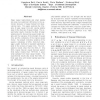111
click to vote
IJCAI
1993
15 years 3 months ago
1993
: This paper presents a causal simulation method for incompletely known dynamic systems in process engineering. The causal model of a process is represented as both a causal networ...
118
click to vote
IJCAI
1997
15 years 3 months ago
1997
Weak causal relationships and small sample size pose two significant difficulties to the automatic discovery of causal models from observational data. This paper examines the infl...
144
click to vote
METMBS
2003
15 years 3 months ago
2003
Causal Probabilistic Networks (CPNs), (a.k.a. Bayesian Networks, or Belief Networks) are well-established representations in biomedical applications such as decision support system...
102
click to vote
UAI
2004
15 years 3 months ago
2004
A causal claim is any assertion that invokes causal relationships between variables, for example, that a drug has a certain e ect on preventing a disease. Causal claims are establ...
120
click to vote
IJCAI
2003
15 years 3 months ago
2003
We introduce a logical formalism of irreflexivc causal production relations that possesses both a standard monotonic semantics, and a natural nonmonotonic semantics. The formalism...
128
Voted
UAI
2008
15 years 3 months ago
2008
Bayesian networks can be used to extract explanations about the observed state of a subset of variables. In this paper, we explicate the desiderata of an explanation and confront ...
123
Voted
NIPS
2008
15 years 3 months ago
2008
The discovery of causal relationships between a set of observed variables is a fundamental problem in science. For continuous-valued data linear acyclic causal models with additiv...
110
click to vote
AAAI
2010
15 years 3 months ago
2010
Methods for discovering causal knowledge from observational data have been a persistent topic of AI research for several decades. Essentially all of this work focuses on knowledge...
138
click to vote
ISSTA
2010
ACM
15 years 4 months ago
2010
ACM
This paper investigates the application of causal inference methodology for observational studies to software fault localization based on test outcomes and profiles. This methodo...
102
Voted
ECSQARU
2001
Springer
15 years 6 months ago
2001
Springer
In this paper we examine the ability to perform causal reasoning with equilibrium models. We explicate a postulate, which we term the Manipulation Postulate, that is required in o...


